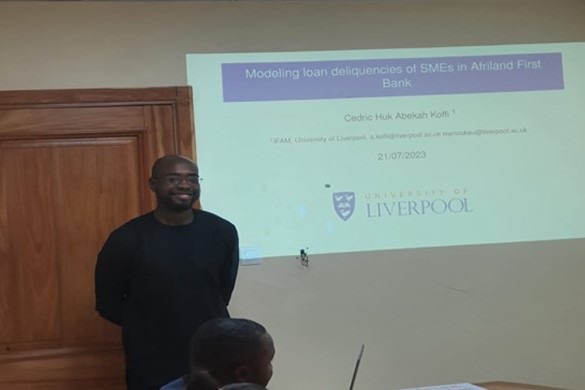Cedric Huk Abekah Koffi is currently a third year PhD student from the Institute of Financial and Actuarial Mathematics (IFAM) at the University of Liverpool.
He recently went on a research project at Afriland First Bank Cameroon (under the supervision of Professor Olivier Menoukeu Pamen), where he conducted an in-depth analysis of the loan book of the bank and developed an early model to explain the dynamics between repayments in large, small and medium enterprises (LSMEs):
Financial institutions, particularly banks, act as loan providers but face the challenge of identifying creditworthy customers from risky ones.
For banks in developing countries, this risk of customers not repaying loans properly (credit risk) increases even more as the financial system is not as advanced as compared to developed countries, and so there is a need to introduce tools which can help alleviate their exposure to loss as well as helping these institutions meet their financial goals.
In this context, the research at Afriland First Bank (Cameroon) was conducted to help the organization take the first steps to reduce the proportion of loans that are not well repaid (non-performing loans – NPLs) and identify customers who are not creditworthy.
One of the major impacts of our project is that it highlighted the negative influence of loans with long maturity (i.e. loans which are repaid over a long period of time) on the repayment performance of customers.
The analysis of the loan book revealed that loans with longer durations tend to become NPLs, confirming a key assumption of the bank. Relating to the issue of NPL, our visit created a channel of suggestions and recommendations that could be used by the bank to improve its process of data structuration, formatting, and storage.
Another important impact of this project was the provision of an in-depth empirical analysis of the repayment dynamics between different sectors, industries, and segments of the bank from January 2018 to April 2023, where profitable parties could be segregated from non-profitable ones.
I also had the opportunity to acquaint myself with some new colleagues at the bank and grow my professional network.
In the last part of our project, we built an early prediction model and demonstrated its capabilities. The next step in our research is to measure the impact of our findings and recommendations at the bank level so that with future feedbacks we can improve the predictive capabilities of the model alongside the process of data governance.
Some of our future project activities will look at modelling delinquency of accounts when they are repaying more than one loan. Furthermore, we may also look at modelling the optimal duration as well as the loan amount to disburse to applicants so as to assure the minimal level of credit risk with acceptable profit.
This project was funded by the University of Liverpool QR Fund.
